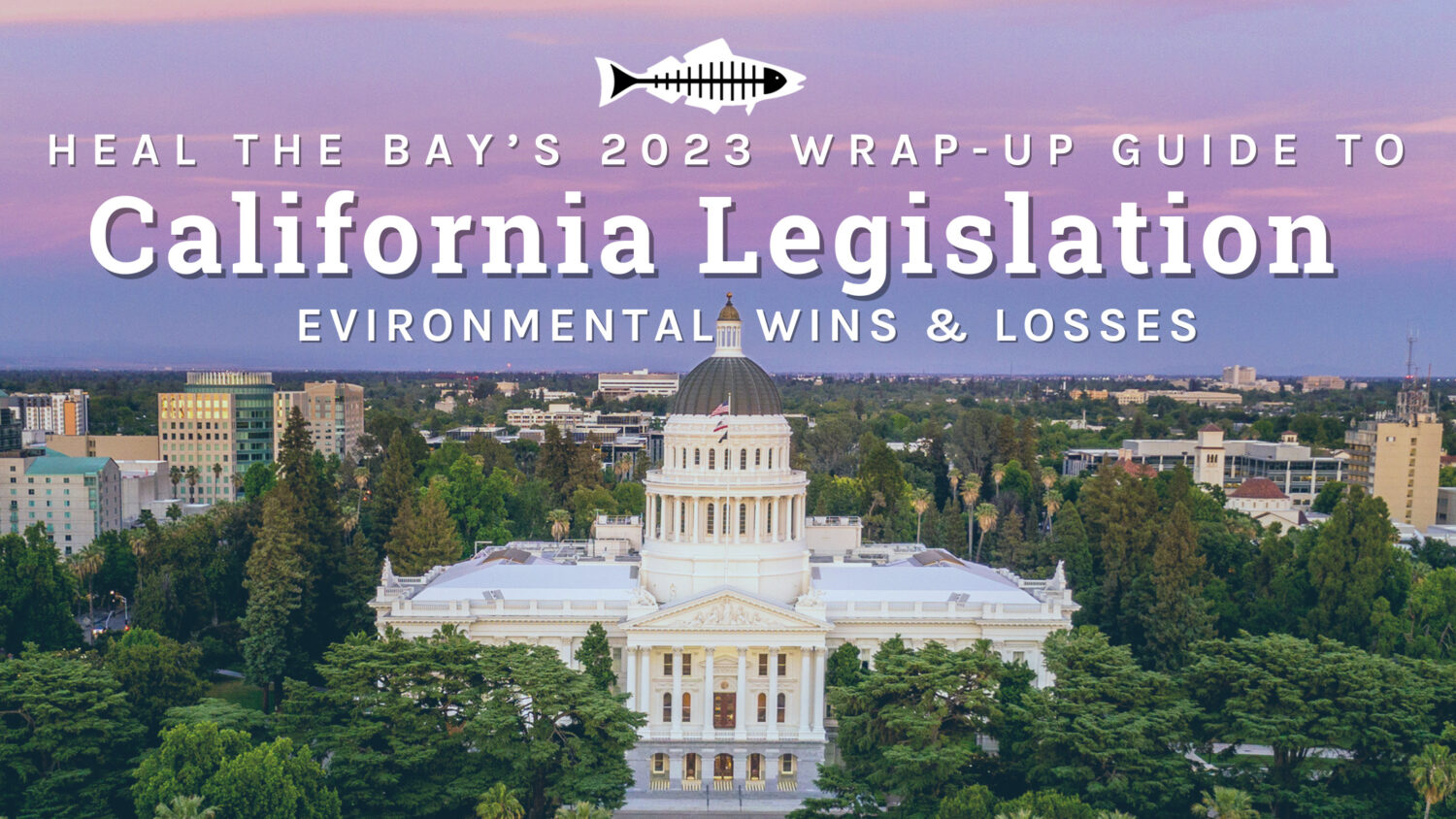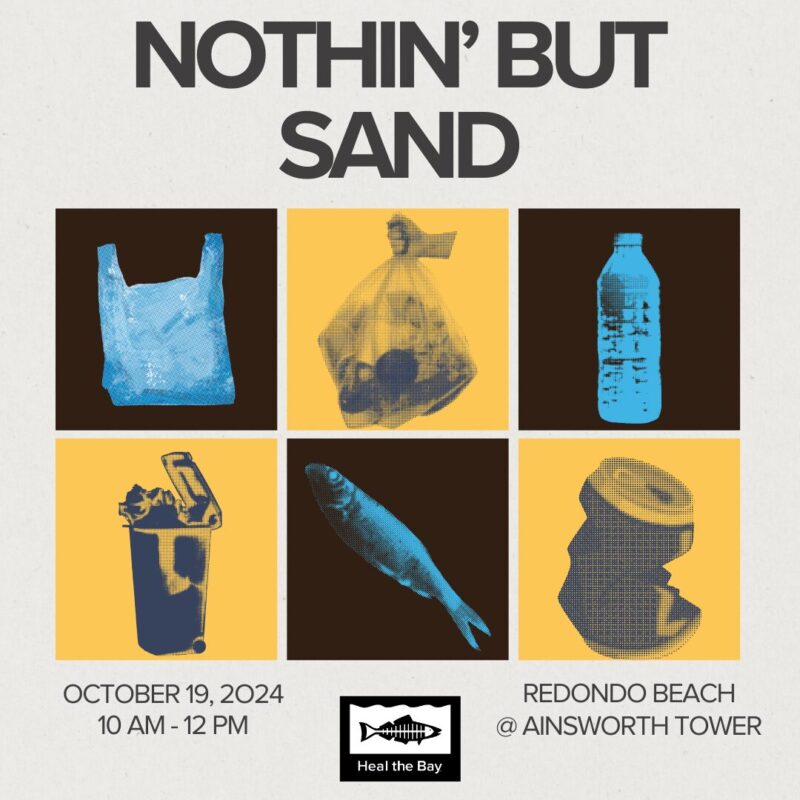Heal the Bay’s 2023 Legislative Wrap-up Guide

Heal the Bay closely monitors the progress of bills that impact California’s ecosystems and communities each legislative calendar year, and this season has been a rollercoaster ride ranging from game-changing victories in water conservation to ongoing waste and toxin battles. Let’s take a deep dive into the outcomes of key legislation and what it means for healthy, safe, clean water.
Major Wins led by Heal the Bay for Water & Biodiversity
When Heal the Bay sponsors a bill, we take on the responsibility of introducing, advocating for, and shepherding a proposed new law through the legislative process. This year, Heal the Bay co-sponsored two bills that were signed into law.
- Assembly Bill 1572 (Friedman): Irrigation of Non-functional Turf, co-sponsored by Heal the Bay, NRDC, and Metropolitan Water District
a.k.a the “lawn-be-gone” solution for a more water equitable and climate resilient California.
Heal the Bay sponsored AB 1572 which is all about using water more efficiently. The bill bans the use of drinking water to irrigate “non-functional turf” on government and commercial properties. See a patch of grass and wondering if it’s non-functional turf? If the only time a person walks on the grass is to mow it, it’s probably non-functional turf. This bill doesn’t impact landscapes around people’s homes, but it does mean no more watering fancy lawns with precious drinking water at public agencies, restaurants, and corporate campuses. When it goes into effect, AB 1572 is expected to save the same amount of water 780,000 households use in a year! Even major water suppliers supported it. This bill is a huge win toward a more sustainable and water-efficient California. While the bill excludes single-family residential lawns, everyone is encouraged to do their part. To learn about how you can transform your landscape, check out LA Department of Water and Power and Metropolitan Water District’s turf replacement programs.
- Assembly Bill 1611 (Lowenthal): Fishing Violations, co-sponsored by Heal the Bay and Resources Legacy Fund
a.k.a the “win-win” for fish and anglers.
AB 1611 simplifies and clarifies fishing regulations in California by allowing Fish and Game wardens to cite certain administrative commercial fishing violations as either a misdemeanor or an infraction. This change ensures that wild fishery enforcement is more equitable.
This smart approach ensures that the punishment fits the crime by striking a balance between fairness and strong governance. This bill had strong backing from fishery regulatory agencies and its passing means California is taking essential steps to safeguard its fisheries and continue its tradition of leading in environmental protection. It’s a win-win for both nature and the community.
Want to help Heal the Bay monitor our precious Marine Protected Areas (MPAs)? Become an MPA Watch Volunteer and learn how to identify and report violations – the first step to becoming an MPA Watch volunteer is to attend our next Volunteer Orientation on January 11, 2024, at 6 PM (Heal the Bay Aquarium).
Want to learn more about the bills Heal the Bay helped sponsor? 🔴 WATCH our 2023 Legislative Wins Break-Down on Instagram.
Other Exciting Legislative Wins
- Senate Bill 244 (Eggman): Right to Repair
a.k.a “Don’t waste it, fix it”.
Dubbed the “Right to Repair Act”, the passage of SB 244 will have a powerful impact on reducing electronic waste by giving consumers more accessibility to the parts and pieces needed to fix electronics and appliances. Beginning July 1, 2024, manufacturers will have to provide you, their customer, with documentation, parts, and tools for repairs, even if the warranty has expired. This law is all about making repairs more accessible, reducing waste, and promoting a fair marketplace for fixes. Heal the Bay supported this bill through our Clean Seas Lobbying Coalition.
Tough Losses: Vetoed Bills
Not every bill makes it through the process, Governor Newsom vetoed several bills that Heal the Bay would have preferred to see signed into law:
- Assembly Bill 1628 (McKinnor): Microfiber Filtration
a.k.a “Microfiber filters could make massive impacts on the environment”.
AB 1628 was focused on microfiber pollution, a major contributor to microplastic pollution around the globe. It would have required every new washing machine sold in the State, whether for homes or industrial use, to come with a special microfiber filter. This filter is like a lint trap that catches tiny microfibers as small as 100 micrometers, preventing them from getting into our environment. The bill was vetoed by Governor Newsom who expressed concerns about increased costs to consumers and instead suggested the exploration of alternative, incentive-based approaches. Heal the Bay does not agree with his false narrative, and, in fact, bill analysis still favors a legislative approach showing that increased costs would have actually been minimal for both consumers and manufacturers.
- Assembly Bill 1423 (Schiavo): PFAS in Artificial Turf
a.k.a A “turf” loss for the environment.
AB 1423 would have prevented California public entities, schools, and certain colleges from buying or installing artificial turf or synthetic surfaces containing harmful PFAS chemicals (perfluoroalkyl and polyfluoroalkyl substances), commonly called “forever chemicals,” which are highly toxic compounds persistent in the environment and linked to a myriad of public health concerns. The bill would have also encouraged manufacturers to choose safer alternatives when replacing PFAS in these surfaces. Unfortunately, Governor Newsom vetoed this bill citing a lack of regulatory oversight to enforce the ban. Heal the Bay continues to seek opportunities to educate the public about the dangers of PFAS and encourage alternatives wherever possible.
It’s Not Over Yet: Bills to Revisit
While some bills came out on top and others met their downfall this year, a few were set on a two-year track that may potentially be reintroduced in 2024 (also known as part two of the two-year legislative session). Below are some standout bills that Heal the Bay is excited to work on when they arise again:
- Assembly Bill 1290 (Rivas): Plastic Additives
AB 1290 sought to adopt new plastic regulations by putting restrictions on certain plastic products and additives. The bill aimed to ban making, selling, offering for sale, or distributing especially toxic items like colored plastic bottles and plastic packaging with toxic substances in California. These restricted substances include colorants that make plastic hard to recycle, additives that make plastic break down into tiny pieces, and harmful PFAS chemicals. This bill was extended to a 2-year bill and Heal the Bay continues to support its passage.
- Senate Bill 552 (Newman): Reuse for Dine-In
SB 552 was a tough loss for Heal the Bay and our partners along with bill sponsors at the Clean Seas Coalition. This bill would have prohibited food facilities from providing a dine-in customer with any single-use foodware accessory or single-use food packaging. LA County recently passed a similar law thanks to Heal the Bay and Reusable LA, and we know just how effective this law would be at reducing harmful single-use plastic waste from the source. Unfortunately, thanks to logistical challenges, this bill never really took off this year, but Heal the Bay is really excited to push even harder for this legislation next year.
For a great summary of outcomes on climate and other environmental bills, check out the recap from LA Times reporter, Sammy Roth.
While this year was peppered with heartbreaks and an unusually high number of bill vetoes, Heal the Bay is still celebrating our wins and looking forward to next year. From equitable fishing regulation to water conservation and waste reduction, our state is at the forefront of safeguarding our precious ecosystems. As we move forward, Heal the Bay will continue to fight for healthy, safe, clean water for all. Keep following along to stay in the know and learn how you can help us support the next round of California environmental bills!
ACTION LINK(S)
STAY IN THE KNOW WITH OUR NEWSLETTER
SUPPORT OUR SCIENCE AND POLICY PROGRAMS
SHOP HEAL THE BAY TO PROTECT WHAT YOU LOVE



